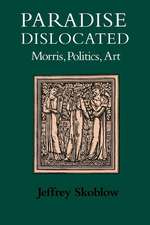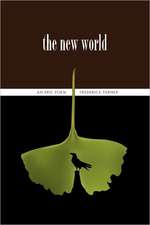Beauty: The Value of Values
Autor Frederick Turneren Limba Engleză Paperback – 31 dec 2014
| Toate formatele și edițiile | Preț | Express |
|---|---|---|
| Paperback (1) | 260.89 lei 6-8 săpt. | |
| University of Virginia Press – 31 dec 2014 | 260.89 lei 6-8 săpt. | |
| Hardback (1) | 441.25 lei 6-8 săpt. | |
| University of Virginia Press – 31 dec 2014 | 441.25 lei 6-8 săpt. |
Preț: 260.89 lei
Nou
Puncte Express: 391
Preț estimativ în valută:
49.92€ • 52.26$ • 41.31£
49.92€ • 52.26$ • 41.31£
Carte tipărită la comandă
Livrare economică 05-19 aprilie
Preluare comenzi: 021 569.72.76
Specificații
ISBN-13: 9780813930695
ISBN-10: 0813930693
Pagini: 154
Dimensiuni: 152 x 229 x 9 mm
Greutate: 0.24 kg
Editura: University of Virginia Press
ISBN-10: 0813930693
Pagini: 154
Dimensiuni: 152 x 229 x 9 mm
Greutate: 0.24 kg
Editura: University of Virginia Press
Textul de pe ultima copertă
In this groundbreaking interdisciplinary work, Frederick Turner presents a new theory of aesthetics based on the argument that beauty is an objective reality in the universe. He identifies the experience of beauty as a pancultural, neurobiological phenomenon. Drawing on recent work in a wide range of fields--ritual and dramatic performance, the oral tradition, paleoanthropology and human evolution, neurobiology, cosmology and theoretic physics, chaos theory and fractal mathematics--the book describes evolution as a self-organizing, emergent process that generates increasingly advanced forms of self-reflection, and proposes that the experience of beauty is the recognition of this evolutionary process and the reward for participating in it. The experience of aesthetic beauty, Turner says, is an adaptive function that drives evolution through sexual selection. Those individuals most sensitive to beauty survived surface cultural changes, excelled in mating rituals, and were participants in the positive evolution of the species. Turner shows how, as a result, neurotransmitters in the brain respond to certain inherited systems by which we appreciate beauty. Turner also presents the implications for theories of art and literature that follow from his identification of the inherent genres of human aesthetic experience. Forms of art cannot be arbitrary but must be rooted in our biological inheritance. This calls into question theories about modern art, and suggests that modernist culture turned its back on beauty in an attempt to repress and avoid the shame of humanness and our biological nature. This book breaks radically with contemporary positions in psychology, sociology, philosophy, andart, and offers an alternative to present trends in literary and critical theory. It should be of interest to a wide variety of readers, including the artistic community, critical theorists, students of oral traditions, philosophers, and aestheticians.

















